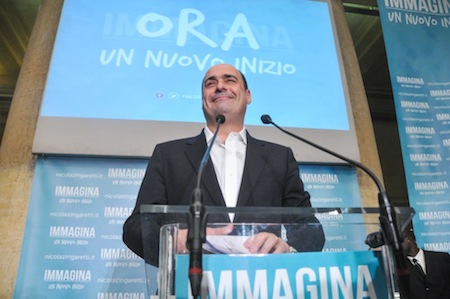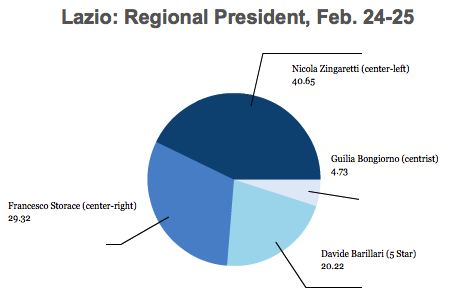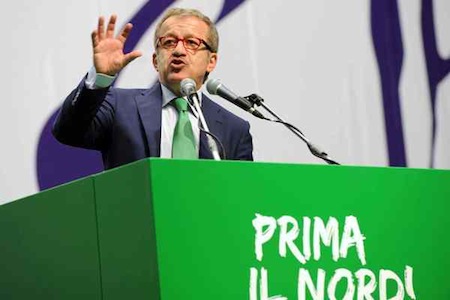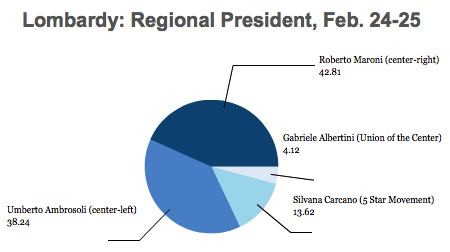Although relatively more attention has been on Italy’s general election and its aftermath and on Roberto Maroni’s victory in the Lombardy regional elections, Nicola Zingaretti’s victory as the next regional president of Lazio has launched the career of a new face of the next generation of Italy’s political leadership while delivering a stinging defeat to one of Italy’s most prominent far-right figures. ![]()
![]()
Zingaretti (pictured above), the candidate of the center-left Partito Democratico (PD, Democratic Party), won a whopping victory over Lazio’s former regional president Francesco Storace, leader of La Destra (The Right), a nationalist conservative party in Italy, Davide Barilliari, the candidate of the Movimento 5 Stelle (M5S, the Five Star Movement) and Giluia Bongiorno, who led a centrist coalition in the election.
The result leaves the center-left in control of 28 seats in Lazio’s regional parliament, with 13 for the center-right, seven for the Five Star Movement and just two for Bongiorno’s centrists.
Zingaretti, elected to the European Parliament in 2004 and thereafter elected as president of the province of Rome in 2008, is the latest center-left star to emerge out of Roman politics, and he could well use the Lazio presidency as a springboard into a future in national politics. Former Rome mayor Francesco Rutelli (unsuccessfully) led the center-left in the 2001 general election and subsequently served as prime minister Romano Prodi’s minister of culture and tourism. Rutelli’s successor as Rome mayor, Walter Veltroni, helped found the Democratic Party in Italy, and thereupon led it (again, unsuccessfully) in the 2008 general election.
Zingaretti’s first task will be to restore integrity to regional government in Lazio, Italy’s third-most populous region. The outgoing incumbent, the PdL’s Renata Polverini, resigned early after being implicated in a funding scandal whereby public officials were using government funds for private use. Her predecessor, the center-left Piero Marrazzo, lost reelection after he was blackmailed over a video recording of Marrazzo engaging the services of a transsexual prostitute.
More immediately, however, the strength of Zingaretti’s campaign may well have helped Pier Luigi Bersani’s centrosinistra (center-left) coalition win victory in the senatorial contest in Lazio — Bersani’s coalition won just 32.3% against former prime minister Silvio Berlusconi’s centrodestra (center-right) coalition, which won 28.8%, a much smaller margin of victory than Zingaretti posted over Storace.
The landslide defeat is a setback for Storace, president of Lazio from 2000 to 2005, and one of the most well-known members of Italy’s nationalist right.
But it’s also a setback for Italy’s nationalist conservatives after a campaign saw Berlusconi shared some kind words for Italy’s former fascist dictator Benito Mussolini, and whose party, the Popolo della Libertà (PdL, People of Freedom), includes Mussolini’s granddaughter, Alessandra Mussolini, a former Playboy model, was elected to Italy’s upper house, the Senato (Senate) over the weekend. Continue reading Zingaretti victory in Lazio caps subdued election for Italy’s far right



